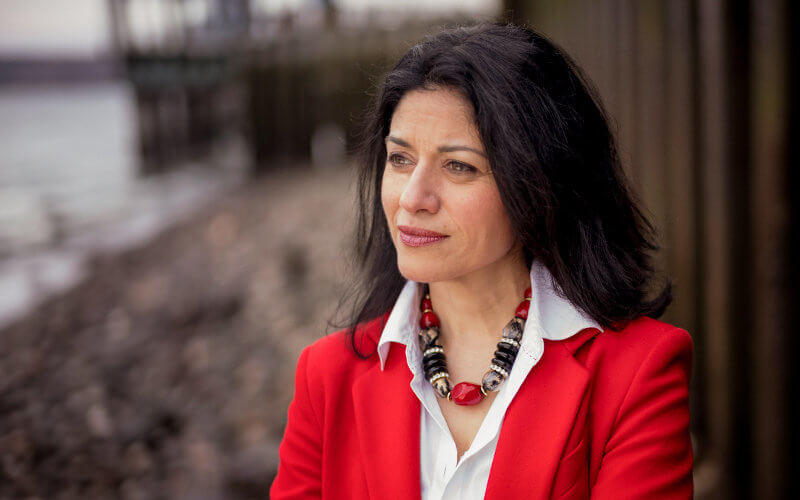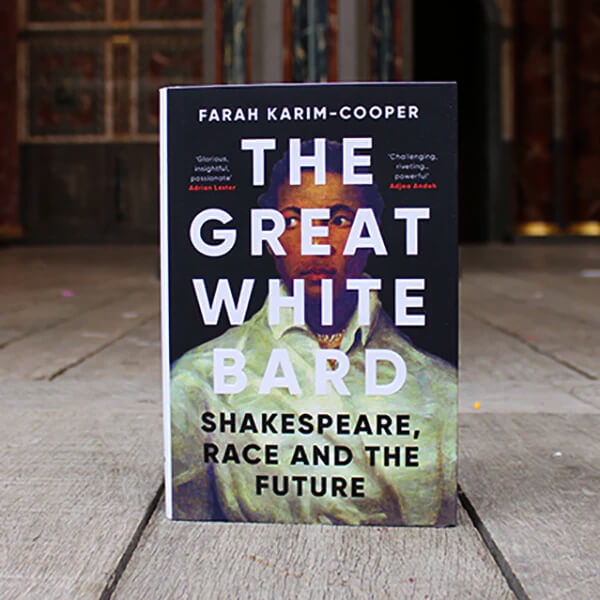
Farah Karim-Cooper saw “Dead Poets Society” at the cinema when she was 18 years old. She remembers watching as Robin Williams’ character jumped on his desk at Welton Academy and told his students, “We must constantly look at things in a different way.”
That’s when she knew that she wanted to study English.
“I was really moved by all of the poetry and literature in the film, and I loved the kind of teacher Robin Williams’ character represented,” said Karim-Cooper, who followed her passion for literature to Cal State Fullerton.
It was there, in an English course taught by Kay Stanton, professor of English, comparative literature and linguistics, that Karim-Cooper first realized her love for William Shakespeare’s work.
“It wasn’t until that first Shakespeare course that I really saw what was exciting about his dramatic complexity,” said Karim-Cooper ’95 (B.A. English).
Beyond appreciating his Elizabethan plots and characters, the CSUF alumna began looking at Shakespeare “in a different way,” focusing on race and cultural identity in his plays.
Her scholarship in this area led to the publication of her book, “The Great White Bard: How to Love Shakespeare While Talking About Race,” which was named by The New Yorker, TIME Magazine and NPR as one of the best books of 2023 for its ability to center racial issues in Shakespeare’s literature.

Shakespeare is one of the most recognized authors in history, often referred to as the epitome of the Western canon, but that doesn’t mean that his work should be studied in a vacuum, explained Karim-Cooper.
The key is to evaluate his texts in the contemporary moment and question his employment of racial themes and ideologies, so that readers can decide what they want to do with the work next, she said.
“This book is about facing the discomfort of Shakespeare’s world, about disentangling Shakespeare from his 18th century colonial construction and finding a way to interrogate, critique and understand Shakespeare’s own ideas about racial identity and racism – while still retaining our love and affection for his canon of works,” said Karim-Cooper.
The work examines the depictions of race in five of Shakespeare’s plays, including “The Merchant of Venice,” “Antony and Cleopatra,” “The Tempest,” “Othello” and Karim-Cooper’s personal favorite, “Titus Andronicus.”
“Shakespeare provides us with a set of critical tools for thinking. In his plays, a multitude of complex questions are addressed: Why does society not enable interracial marriage to thrive? How are we all slightly overambitious and how far would we go for power?” she said. “These are all modern questions. We can use Shakespeare as a site to explore the big questions and the little ones, too.”
Traveling to the Globe
At Cal State Fullerton, Karim-Cooper found that her excitement for literature was perfectly matched in the Department of English, Comparative Literature and Linguistics.
Karim-Cooper said she was inspired by her professors’ research in the field, and she still reflects on the examples they set for her as she continues her work in race scholarship.
“She was enduringly memorable—the best writer in the class and the most enthusiastic and engaged with the material,” said Stanton. “Since then, as we are both Shakespeare specialists, we have met often at professional conferences, and I’m thrilled that she has risen to great, and well-deserved, heights in our field, inspiring all who meet her.”
As a student, Karim-Cooper was actively involved in CSUF’s chapter of Sigma Tau Delta, an international English honor society that provides students with opportunities for academic and civic engagement, including poetry readings, book drives and networking events.
“I found the professors really supportive of the events and programs we wanted to produce,” said Karim-Cooper, who served as the organization’s president.
After graduating from CSUF, she went on to earn her Ph.D. from Royal Holloway, University of London before joining Shakespeare’s Globe in London, where she has worked for almost 20 years.
She serves as the director of education and research at Shakespeare’s Globe, a world-renowned reconstruction of the Globe Theatre, where many of Shakespeare’s first plays were performed after it was built in 1599.
At the theatre, Karim-Cooper oversees the research and collections team, the higher education team and the education producing team. Along with the joint director of education, she is responsible for the strategic direction of the education department and its financial contribution to the organization.
Karim-Cooper is also a professor at King’s College London, where she supports graduate students and teaches courses on such topics as critical race theory and Shakespeare studies.
For students who are interested in pursuing careers in research, the Shakespeare scholar said, “You have to love what you’re investigating – the thrill of discovery, the thrill of poetry or literary works need to be at the forefront.”